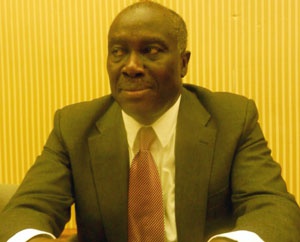President of the Ghana Employers Association Terence Ronald Darko sees no quick turnaround for the economy as government continues to live beyond its means, warning that business conditions will remain grim going into 2015.
Speaking in an interview with the B&FT in Accra on Tuesday, Mr. Darko, who is also the Managing Director of automobile distributor Mechanical Lloyd, underlined the grim prospects confronting companies because of weak demand, high taxes and rising production costs.
He said a combination of these factors gave Mechanical Lloyd a rare financial-year loss in 2013.
Operating conditions in both 2013 and 2014 have been “difficult”, he stated, adding that a turnaround is not going to come quickly.
“Can you spend more than what you earn unless you go and borrow? And when you borrow you will have to pay interest. The turnaround is not coming anytime soon, not even in 2015,” he told the B&FT.
“We need to live within our means,” he added, referring to the government’s hefty budget deficits which many see as the fundamental cause of economic instability and the bleak sentiments of companies.
He said companies are reeling from policies to rein-in the deficit, which was above 10 percent of GDP in both 2012 and 2013, stressing that the tax rises and suppression of expenditure through accumulating arrears have put a strain on the private sector.
Mechanical Lloyd, he disclosed, posted a loss before tax of GH¢1.46million in 2013, from a profit position of GH¢7.78million in 2012. This was after the company’s revenues declined by 18 percent from GH¢46.95million to GH¢38.41million.
The company’s sales in 2014 “are as bad as last year”, he said, adding that Mechanical Lloyd has frozen employment and is working with the minimum staff size necessary.
In May, private sector chiefs expressed similar weak confidence in the economic outlook, and also cast doubt on the effectiveness of the government’s policies to restore stability.
“We don’t see the road ahead; we don’t know the policies that will be put together to lift us from where we are,” Nana Osei-Bonsu, chief executive of the Private Enterprise Federation (PEF), said in an interview last month.
Nana said the private sector is not confident in the government’s budget policies and cannot rely on the projections that have been made in the 2014 budget, because government has shown a propensity to miss its own targets.
Government this year is projecting a fiscal deficit equivalent to 8.5 percent of GDP, but both the International Monetary Fund, Fitch Ratings and Moody’s have forecast the gap to be in double digits for the third consecutive year – unless the government takes more drastic steps to curb spending and boost revenues.
The terribly weak cedi is another cause of anxiety for businesses, with the currency now close to losing a third of its value against the dollar.
The situation has cast a sombre shadow on many economic sectors directly exposed to the exchange rate, including the downstream petroleum sector, where a large subsidy bill has been run-up by government due to exchange rate losses that now threaten the ability of oil-importing firms to bring in fresh shipments of crude oil.
After being quoted at 2.5 cedis to the dollar in January, the exchange rate of the currency has worsened to 3.1 cedis in June, its worst performance in 14 years.
Click to view details



Business News of Thursday, 26 June 2014
Source: B&FT

















